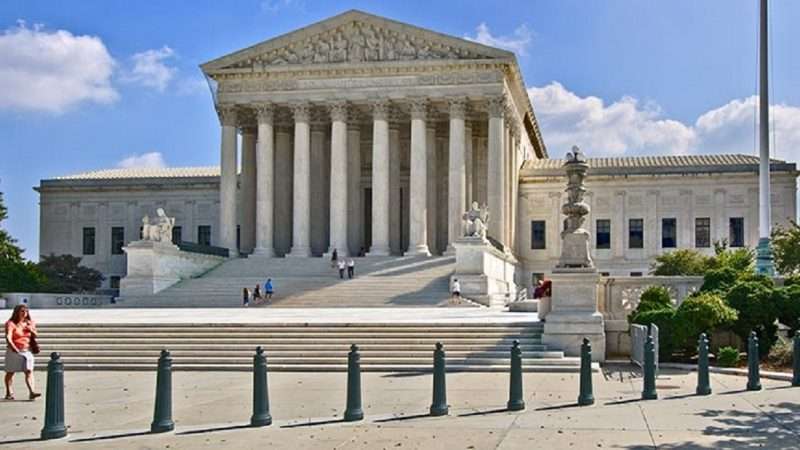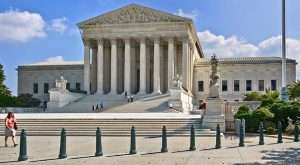

I am putting this post up on behalf of Northwestern University law Prof. Steven Calabresi, at his request. While Steve is a contributor to the Volokh Conspiracy blog, he has been having difficulty accessing his account. In the interests of getting this post up as quickly as possible, I am posting it for him. Everything that follows this sentence was written by Steve, not me (Ilya Somin):
In Moore v. Harper, 600 U.S. ____ (2023), the Supreme Court in a landmark opinion issued yesterday rejected the Independent State Legislature Doctrine. At issue was the meaning of the word "legislature" in the Elections Clause of Article II. That Clause provides that: "The Times, Places and Manner of holding Elections for Senators and Representatives, shall be prescribed in each State by the Legislature thereof; but the Congress may at any time by Law make or alter such Regulations, except as to the Places of chusing Senators"
Proponents of the Independent State Legislature Theory believed that after President Trump's rejection by the voters in the 2020 presidential election in Pennsylvania, Georgia, Wisconsin, and Arizona, the Republican State Legislatures of those four states, acting alone without the Governor or judicial review by the State Supreme Court, could have awarded Pennsylvania's, Georgia's, Wisconsin's, and Arizona's Electoral College votes to Trump, which would have caused him to win a second term in 2020. Article II, Section 1, Clause 2 in the Presidential Electors Clause says that "Each State shall appoint, in such Manner as the Legislature thereof may direct."
The issue for the Supreme Court in Harper v. Moore is does the word "legislature" in these two clauses mean "the state senate and house of representatives" or does it mean "the lawmaking process in the state including the governor, who in all 50 states has a veto; the state supreme court, which in all 50 states have the power of judicial review under state constitutions; and popular initiatives and referenda, which exist in about half the states, and which in some states have set up Non-Partisan Redistricting Commissions, which would be unconstitutional under the Independent State Legislature Theory."
The original public meaning of the word "Legislature" in 1787 and 1788, when the U.S. Constitution was ratified, is set out in Samuel Johnson's 1755 Dictionary of the English Language. Here it is, with examples of the correct usage in Italics:
"Legisla'ture. n.s.
[from legislator, Latin.] The power that makes laws.
Without the concurrent consent of all three parts of the legislature, no law is or can be made.
Hale's Com. Law.In the notion of a legislature is implied a power to change, repeal, and suspend laws in being, as well as to make new laws.
Addison's Freeholder, №. 16."
The Hale's Com. Law definition refers to the fact that in Great Britain, in 1755, the enactment of a law required the approval of the House of Commons, the House of Lords, and the King. The Addison's Freeholder, No. 16 definition makes it clear that in half of the United States popular initiatives and referenda are legislatures, because they can change, repeal, and suspend.as well as to make new laws.
Samuel Johnson's 1755 Dictionary of the English Language makes it crystal clear that the Independent State Legislature Doctrine is just plain wrong on originalist grounds.
Chief Justice Roberts' superb opinion for six justices of the Supreme Court emphasized that state senates and state houses of representatives are merely creatures of state constitutions. They share the power to make laws with governors who in all 50 states have the veto power and with state supreme courts, which in all 50 states have the power of judicial review. In addition, in half the states elections laws can be made by popular initiatives and referenda. By 1787 and 1788, state supreme courts had, as Chief Justice Roberts points out, exercised the power of judicial review. Executive vetoes were also constitutionally provided for in Massachusetts and New York.
It is thus inconceivable that the conventions that ratified the Constitution would have meant the word "Legislature" to mean only state senates and state houses of representatives as opposed the whole lawmaking process of a state. Chief Justice Roberts also notes that the Independent State Legislature Doctrine conflicts with several Supreme Court precedents and finds support only in a three-justice concurrence in Bush v. Gore, 531 U.S. 98 (2000), an opinion that was written with great haste and insufficient briefing.
Chief Justice Roberts' opinion notes that ordinarily the Supreme Court defers to state supreme courts as having the last word on questions involving the meaning of state law as was held in Murdock v. City of Memphis, 87 U.S. 590 (1875). Quite importantly, however, Chief Justice Roberts qualified the deference federal courts should give to state court interpretations of state law by suggesting that such state court decisions must be the product of an ordinary course of judicial review. Cf Bush v. Gore? I wrote an amicus brief in this case with Yale Sterling Professor of Law, Akhil Reed Amar and Professor Vikram D. Amar, which is linked here.
The post Steve Calabresi on Moore v. Harper appeared first on Reason.com.







